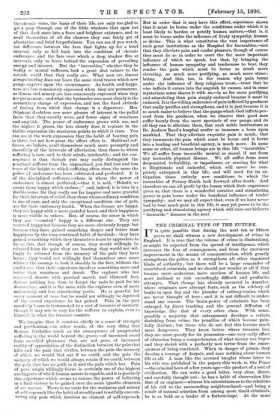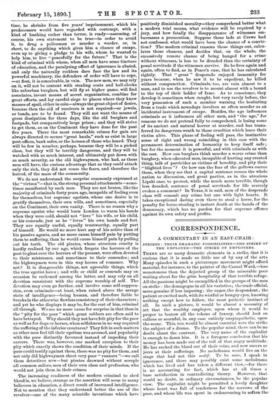THE CRIMINAL TYPE OF THE FUTURE.
TT is quite possible that during the next ten or fifteen years we shall witness a new development of crime in England. It is true that the volume of crime is diminishing, as might be expected from the spread of intelligence, which increases the fear of consequences, and from the enormous improvement in the means of communication, which greatly strengthens the police, as it strengthens all other organised kinds of authority ; but there will be a large remainder of unsubdued criminals, and we should not wonder at all if they became more audacious, more careless of human life, and more inclined to risk exceedingly difficult and profitable attempts. That change has already occurred in America, where criminals now attempt feats, such as the robbery of banks in open day and the plunder of railway-trains, which are never thought of here ; and it is not difficult to under- stand one reason. The brain-power of criminals has been enlarged, by direct teaching and the general diffusion of knowledge, like that of every other class. With some, possibly a majority, that enlargement develops a certain shrinking from crime, the penalties of which become pain- fully distinct; but those who do not feel this become much more dangerous. They know better where treasure lies, they are more greedy for its possession—one very early effect of education being a comprehension of what money can buy— and they shrink with a perfectly new terror from the conse- quences of being convicted. When in danger of prison, they develop a courage of despair, and care nothing about human life at all. A man like the accused burglar whose letter to his wife was published in the papers this week, is, like Peace —the criminal hero of a few years ago—the product of a sort of civilisation. He can write a good letter, very clear, direct, and carefully thought out: he has a habit of observation like that of an engineer—witness his calculations as to the relations of his cell to the surrounding neighbourhood—and being a result of natural selection from among more timid criminals, he is as bold as a leader of a forlorn-hope. At the same
time, he shrinks from five years' imprisonment, which his predecessors would have regarded with contempt, with a kind of loathing rather than terror, is ready—assuming, of course, his own statement to be true—in order to avoid it, to drug a policeman or murder a warder, or, in short, to do anything which gives him a chance of escape, even up to giving a pledge to his wife, whom he wanted to help him, to live "peacefully for the future." That is the kind of criminal with whom, when all men have some tincture of education, and the paralysing effect of ignorance is abated, and only the naturally reckless dare face the law and its powerful machinery, the defenders of order will have to cope, —at first, it is conceivable, in vain. The new men, we may rely on it, will not be content with stealing coats and hall-clocks like suburban burglars, but will fly at higher game, will find associates, invent means of secret organisation, combine for great efforts, and lay careful siege to places where they know masses of spoil, either in coin—always the great object of desire, because then the aid of receivers is not required—or jewels, or bonds, are to be found. They will not want the means of gross dissipation for three days, like the old burglars and footpads, but comparatively large prizes ; and they will strive to get them, as on the Continent they have done for the past five years. There the most remarkable crimes for gain are always directed to secure "great hauls," such as exist in large post-offices, bank safes, or the houses of those who hoard. They will be few in number, perhaps, because they will be a picked 'class, but they will be terribly dangerous, and they will be watched with as much interest, and ultimately put down with as much severity, as the old highwaymen, who had, as these men will have, the curious advantage that as they could attack only the rich, they did not rouse the fears, and therefore the hatred, of the mass of the community.
We do not understand the surprise commonly expressed at the "virtues "—that is, the strong personal attachments —some- times manifested by such men. They are not brutes, like the majority of criminals forty years ago, incapable of feeling even for themselves, but supreme egotists, whose one desire is to gratify themselves, their own wills, and sometimes, especially on the Continent, their own vanity. There is no reason why a supreme egotist who would burn London to warm his hands when they were cold, should not " love " his wife, or his child, or his comrade, just as he " loves " his own hands and feet. They are equally useful, equally trustworthy, equally part of himself. He would no more hurt any of his active than of his passive agents, and no more cause himself pain by putting them to suffering, than he would cause himself pain by pulling out his teeth. The old pirates, whose atrocious cruelty is hardly realised by our age, which forgets the horrors of the past to gloat over the horrors of the present, were often devoted to their mistresses, and sometimes to their comrades; and the highwaymen were in this way heroes of romance. Why not? It is disagreeable things, not agreeable things, which the true egotist hates ; and wife or child or comrade may on occasion be reckoned among the latter, and may rely on all devotion consistent with the supreme worship of self. The devotion may even go further, and involve some self-suppres- sion, even criminals—at least, when raised above the savage state of intelligence—being human, and therefore liable to breaks in the otherwise flawless consistency of their characters ; -and yet he who displays it may be, for the rest of him, criminal all through. We see no more cause for surprise in that than in the "pity for the poor" which great robbers are often said to have betrayed. Why should they not have felt pity for the poor as well as for dogs or horses, when selfishness in no way required the suffering of the inferior creatures? They felt in such matters as other men feel till their egotism was aroused, and popularity with the poor distinctly favoured instead of impeding their 'careers. There was, however, one marked exception to their pity which exactly shows the condition of their minds. If the poor could testify against them, there was no pity for them, and not only did highwaymen shoot very poor "runners "—we call them detectives now—but pirates drowned without scruple all common sailors, men of their own class and profession, who would not join them in their crimes.
The increasing readiness of the modern criminal to shed blood is, we believe, strange as the assertion will seem to many believers in education, a direct result of increased intelligence. Not to mention that they understand better the use of the revolver—one of the many scientific inventions which have positively diminished morality—they comprehend better what a modern trial means, what evidence will be required by a jury, and how fatally the disappearance of witnesses em- barrasses a prosecution. Suppose those lads at Crewe had not confessed, what would have been the chance of a convic- tion P The modern criminal reasons those things out, calcu- lates those chances, and decides that, on the whole, the excessively remote chance of being hanged for a crime without witnesses, is less to be dreaded than the certainty of penal servitude if the witnesses survive. So he fires again and again, often to find, as in Peace's case, that he has calculated rightly. That " great " desperado enjoyed immunity for years because, when he saw it to be expedient, he killed without compunction. Criminals, too, are vain almost to a man, and to use the revolver is to mount almost with a bound to the top of their ladder of fame. As to conscience, they develop it sometimes when caught, but very rarely before, the very possession of such a monitor warning the hesitating from a trade which nowadays involves so often murder as an incidental instrument of escape. Besides, the age influences criminals as it influences all other men, and "the age," for reasons we do not pretend fully to comprehend, is losing some of its ancient and natural horror at murder, and has trans- ferred its dangerous wrath to those cruelties which leave their victim alive. This phase of feeling will pass, the instinctive sense of right and wrong coinciding in this case with the permanent determination of humanity to keep itself safe ; but for the moment it is powerful, and with criminals as with the rest. How can burglars think murder a worse crime than burglary, when educated men, incapable of hurting any created thing, talk of parricides as victims of heredity, and pity their "blighted lives "? Or how can the fear of the gallows coerce them, when they see that a capital sentence rouses the whole nation to discussion, and great parties, as in the atrocious Lipski case, to protest, while the much more terrible, though less dreaded, sentence of penal servitude for life scarcely evokes a comment? In Texas, it is said, men of the desperado class will commit any crime but one with light hearts. It takes exceptional daring even there to steal a horse, for the penalty for horse-stealing is instant death at the hands of the democracy, which has no pardon for that supreme offence against its own safety and profits.



































 Previous page
Previous page